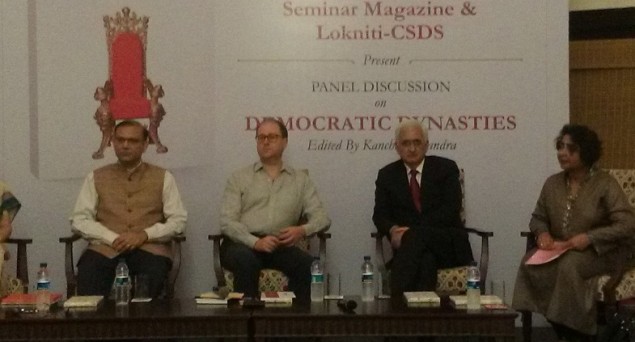Ghazanfar Abbas, IndiaTomorrow.net,
New Delhi, August 07: Cambridge University Press in association with Centre for the Study of Developing Societies (CSDS) on Friday organized a panel discussion on the book- Democratic Dynasties: State, Party & Family in Contemporary Indian Politics edited by Kanchan Chandra. The discussion threw fresh insights into how dynasties shape contemporary Indian politics. The book is a collection of essays on dynastic politics, and introduces a new theoretical perspective on dynasticism in democracies, using original data of 21st century Indian parliaments. The panel discussion held at Bikaner House here in the National Capital was moderated by Patrick French, historian and biographer and Author of the book India, A Portrait.
Speaking about the book and the panel discussion, Ratnesh Kumar Jha, Managing Director, Cambridge University Press, South Asia, said “This book is definitely a valuable addition to the active literature on Political dynasties. The panel discussion will fuel the need of more discussions around the dynastic politics in India within a global comparative context and will further strengthen the need for richer debates.”
The book theorizes the relationship between dynasty and democracy. It is based on original data about over 1200 MPs from India’s 21st century parliaments (2004, 2009, 2014). It places dynasticism in India in a global comparative context. Some 24% of Indian MPs have a dynastic background, placing India squarely in the middle of all democracies for which we have data on dynasticism in the legislature.
It argues that dynastic politics in India is produced and maintained by political parties – in particular the tickets are allotted within parties -and not by an Indian culture preference for dynastic politics, or by voters who prefer dynastic politics. It proposes that dynastic politics in India has a mixed effect on democracy: it creates a birth based form of exclusion, and amplifies dominance, especially among upper castes. But at the same time, it increases the representation of subaltern groups beyond the level at which that they may have been represented otherwise. It further argues that the roots of dynastic politics lie at least in part of modern democratic institutions – states and parties – which give political families a leg-up in the electoral process. It also proposes a rethinking of the view that dynastic politics is a violation of democracy, showing that it can also reinforce some aspects of democracy while violating others.
The book elaborates that these dynasties are from Hindu, male (77%) and from the forward castes (53%). The book reveals that caste-wise proportion in the present parliament of MPs is 43% of Forward castes (27% dynastic), 26% of Backward Castes (22% dynastic), 16% of Dalits (8% dynastic), 10% of Adivasis (17% dynastic), 4% of Muslims but 31% of this small number of Muslim MPs is dynastic. In addition to the caste proportion women constitute only 11% of total number of MPs — 43% of them are from dynastic background. While 65% of Indian population is 35 or under; still the young MPs are lesser and most of them are dynastic.
The discussion revolved around the perspective on how dynasties develop and why they matter. Kanchan Chandra, the editor of the book said that Politics of exclusion is created by democratic dynasty where Caste system & royal family factor play an important role in controlling the political mechanism. The over- representation of upper caste Hindu population (mostly) in parliament and whole political system is a matter of concern.
Expressing concern over the issue Congress leader Salman Khurshid, who is former Minister of External Affairs, said that due to dynasty influenced political system what the dangerous thing I see happening now is the law offences — whether it is by Politicians, Media professionals, Judges and professionals from other fields — where a direct connection mostly with royal family can be seen. “Moreover, often voters are also seen to prefer dynasties and the uncontrolled financing to the political system is affecting the entire system too,” he added.
Nirja Gopal Jayal, professor, Jawaharlal Nehru University, talked about the class based disproportion of MPs in recent years where percentage from dynasties has increased. “This is 16th parliament and we see an obvious increase in dynasties among Parliamentarians where the proportional data of upper class, backward class, gender wise and religious minorities shows a possible relationship between upper caste and dynastic political system,” she said.
While Jayant Sinha, BJP leader and Union Minister of State for Civil Aviation said that there are mainly three factors – political mechanism, party ideology and candidate’s identity — all together shape the dynastic democracies. And currently we are seeing positive changes in the system.
At the end, responding to questions from many research scholars and journalists in the audience, Kanchan Chandra raised the most important fact that until all parties change their policies to select candidates, so people may have options, we can’t see any significant positive changes.
Kanchan Chandra is Professor of Politics at New York University and chair of the program on South Asia at the university. She obtained PhD from Harvard University in 2000. She serves on the editorial boards of the American Political Science Review and Comparative Politics.





